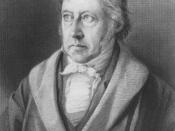The Philosophical Synthesis of Marx
Not very long ago it was extremely fashionable among official men of
learning to say that Marx had really produced nothing new in the
philosophical sphere. Such a well-known philosopher as Wilhelm Wundt in
his Introduction to Philosophy wrote "This lack of clarity in its
metaphysical premises (i.e. of Marxism. N.B.) has a comprehensible
basis in the fact that practical questions alone interest sociological
materialism. Therefore the system does not even possess the necessary
theoretical foundation, which it openly leaves to physiological
materialism to work out."1)
It would be hard to find an argument so utterly ignorant and untrue as
the above-quoted argument of Wundt. However, the course of the social
struggle and of vast ideological changes which, like the overwhelming
movement of geological formations, express the depth of the conflict
within the perishing world of capitalism, has compelled consideration
of the question of Marx the philosopher.
Since the publication of new
works by Marx and Engels (above all the German Ideology and Engels'
Dialectic of Nature) it has become quite clear how right were the
orthodox Marxians when they considered that in the philosophical field
also Marx fills the place due to him.
Indeed Marx is the creator of a great philosophical synthesis with
which none of the latest and most fashionable philosophical systems can
be compared. Marx, as we know, reached dialectical materialism from
Hegel through Feuerbach, including all the rational elements of the
preceding thousand years of philosophical development in his system. He
had a splendid knowledge of the history of philosophy and there are no
more brilliant historical and philosophical characterisations (both
from the point of view of the social conditioning of doctrines and that
of their "immanent" logic) than certain of Marx's characterisations.2)
In order to show the full originality...


